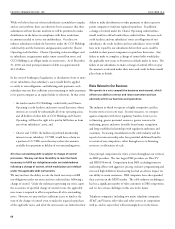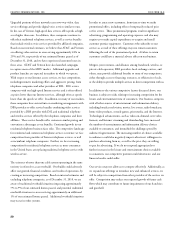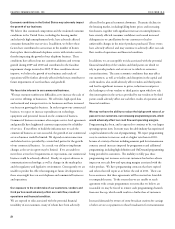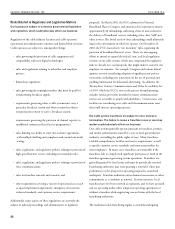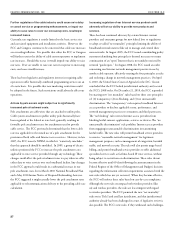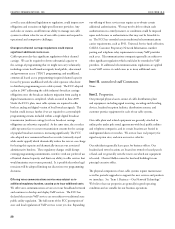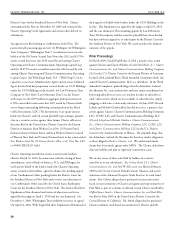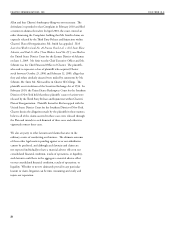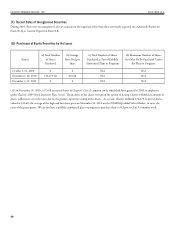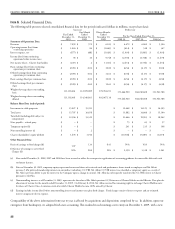Charter 2010 Annual Report Download - page 40
Download and view the complete annual report
Please find page 40 of the 2010 Charter annual report below. You can navigate through the pages in the report by either clicking on the pages listed below, or by using the keyword search tool below to find specific information within the annual report.
Further regulation of the cable industry could cause us to delay
or cancel service or programming enhancements, or impair our
ability to raise rates to cover our increasing costs, resulting in
increased losses.
Currently, rate regulation is strictly limited to the basic service tier
and associated equipment and installation activities. However, the
FCC and Congress continue to be concerned that cable rate increases
are exceeding inflation. It is possible that either the FCC or Congress
will further restrict the ability of cable system operators to implement
rate increases. Should this occur, it would impede our ability to raise
our rates. If we are unable to raise our rates in response to increasing
costs, our losses would increase.
ere has been legislative and regulatory interest in requiring cable
operators to offer historically combined programming services on an
á la carte basis. It is possible that new marketing restrictions could
be adopted in the future. Such restrictions could adversely affect our
operations.
Actions by pole owners might subject us to signicantly
increased pole attachment costs.
Pole attachments are cable wires that are attached to utility poles.
Cable system attachments to public utility poles historically have
been regulated at the federal or state level, generally resulting in
favorable pole attachment rates for attachments used to provide
cable service. e FCC previously determined that the lower cable
rate was applicable to the mixed use of a pole attachment for the
provision of both cable and Internet access services. However, in late
2007, the FCC issued a NPRM, in which it “tentatively concludes”
that this approach should be modified. In 2009, a group of electric
utilities petitioned the FCC to increase the pole attachment rates
applicable to voice service provided through any technology. ese
changes could affect the pole attachment rates we pay when we offer
either data or voice services over our broadband facility. Any changes
in the FCC approach could result in a substantial increase in our
pole attachment costs. In its March 2010 National Broadband Plan
and a May 2010 former Notice of Proposed Rulemaking, however,
the FCC suggested it might actually lower the pole attachment rates
applicable to telecommunications delivery to the prevailing cable rate
calculation.
Increasing regulation of our Internet service product could
adversely affect our ability to provide new products and
services.
ere has been continued advocacy by certain Internet content
providers and consumer groups for new federal laws or regulations
to adopt so-called “net neutrality” principles limiting the ability of
broadband network owners (like us) to manage and control their
own networks. In August 2005, the FCC issued a nonbinding policy
statement identifying four principles it deemed necessary to ensure
continuation of an “open” Internet that is not unduly restricted by
network “gatekeepers.” In August 2008, the FCC issued an order
concerning one Internet network management practice in use by
another cable operator, effectively treating the four principles as rules
and ordering a change in network management practices. On April
6, 2010, the United States Court of Appeals for the D.C. Circuit
concluded that the FCC lacked jurisdictional authority and vacated
the FCC’s 2008 order. On December 21, 2010, the FCC responded
by enacting new “net neutrality” rules based on three core principles
of: (1) transparency, (2) no blocking, and (3) no unreasonable
discrimination. e “transparency” rule requires broadband Internet
access providers to disclose applicable terms, performance, and
network management practices to consumers and third party users.
e “no blocking” rule restricts Internet access providers from
blocking lawful content, applications, services, or devices. e “no
unreasonable discrimination” rule prohibits Internet access providers
from engaging in unreasonable discrimination in transmitting
lawful traffic. e new rules will permit broadband service providers
to exercise “reasonable network management” for legitimate
management purposes, such as management of congestion, harmful
traffic, and network security. e rules will also permit usage-based
billing, and permit broadband service providers to offer additional
specialized services such as facilities-based IP voice services, without
being subject to restrictions on discrimination. ese rules do not
become effective until 60 days following the announcement in the
Federal Register of the Office of Management and Budget’s decision
regarding the information collection requirements associated with the
new rules which has not yet occurred. When they become effective,
the FCC will enforce these rules based on case-by-case complaints.
Although the new rules encompass both wireline providers (like
us) and wireless providers, the rules are less stringent with regard
to wireless providers. e FCC premised the new “net neutrality”
rules on its Title I and ancillary jurisdiction, and that jurisdictional
authority already has been challenged in court. A legislative review is
also possible. e FCC’s new rules, if they withstand such challenges,




